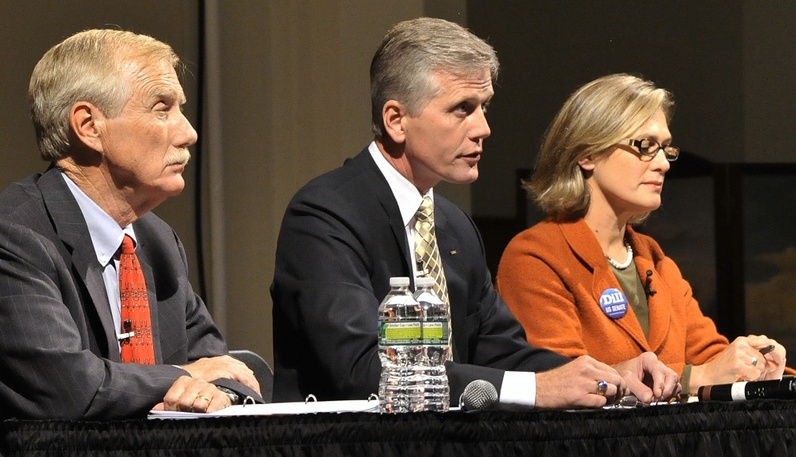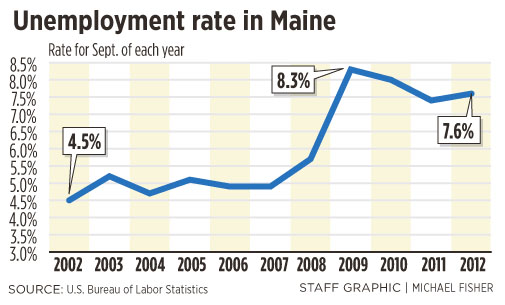Maine’s U.S. Senate candidates have starkly different ideas about how to strengthen the economy and get unemployed Americans back to work.
Republican Charlie Summers would follow the prescription of his party’s leaders: remove regulation and limit taxes so that small businesses can grow and hire again.
Democrat Cynthia Dill also sticks closely to her party’s plan: invest in infrastructure and green energy and reduce the tax burden on the middle class by collecting more tax revenue from the wealthiest Americans.
Independent Angus King’s economic plan includes a blend of those approaches — streamlined regulation and government investments — as well as student debt relief and other initiatives.
Jobs and the economy are, by far, the top two concerns of Maine voters, according to recent opinion polls. More than four years after the financial industry’s collapse and the start of the deepest recession in decades, more than 50,000 Mainers — 7.6 percent of the work force — remain unemployed.
About the same number of workers are underemployed, working low-wage, temporary or part-time jobs just to pay the bills.
And many Mainers who didn’t lose jobs have lost ground. Maine had the slowest rate of income growth of all states in 2011, according to federal statistics.
A survey of Maine voters conducted for the Portland Press Herald in mid-September showed that 35 percent believe they are less economically secure than they were four years ago, while 20 percent said they are better off.
Nearly nine in 10 voters polled said the candidates’ positions on jobs and the economy will affect their decisions about who to send to the U.S. Senate for the next six years.
Maine’s next senator won’t single-handedly create any jobs or fix the economy. But the person who replaces Republican Olympia Snowe will have a chance to shape national policies that can set the stage for economic growth, or discourage it.
The Press Herald analyzed what the candidates have been saying about their approaches to the economy and jobs, and what business experience they would bring to the Senate. Here is a closer look.
THE REPUBLICAN
Secretary of State Charlie Summers has campaigned with a simple, conservative economic plan: lower taxes and reduce regulation.
“If we want to do something to open up this economy and grow our way out of this economy, we’ve got to get government out of the way,” Summers said during a debate in Bangor last month. “Get our debt under control and get our spending under control and let our small businesses grow our way out of this economy.”
Summers supports spending cuts to reduce the federal deficit and opposes any tax increases, including on the wealthiest Americans, which he argues would discourage growth and prolong the slowdown. Along with opposing tax increases, he has said he supports repealing capital gains taxes on sales of stock.
Summers has not provided specifics about which small-business regulations he wants to eliminate, but he has said that Congress should follow the example set by the Republican-controlled Maine Legislature.
The Legislature’s biggest step toward deregulation has been to roll back rules on the health insurance industry, such as allowing insurers to charge older subscribers more and younger subscribers less. Summers has not said he supports that particular change.
Summers also says he wants to help bring down high energy costs by encouraging more domestic oil and gas drilling.
He says he opposes using government spending, such as green energy subsidies, as a way to stimulate economic activity.
Summers would make at least one investment: He would introduce legislation to create the post of national small business advocate, a position similar to one he helped create in the Maine Secretary of State’s Office. The advocate would act as a voice for small businesses that struggle with government regulation.
Summers’ economic and financial experience includes owning Charlie’s Beverage Warehouse, a redemption center and convenience store in Biddeford, from 1992 to 1995 and serving as regional administrator of the Small Business Administration from 2005 to 2007.
THE DEMOCRAT
State Sen. Cynthia Dill has emphasized her support for protecting workers’ rights and for “sensible incentives” to encourage private investments.
Dill has said that regulation must be reasonable for small businesses. However, she opposes deregulating big businesses such as financial institutions, saying that is what caused the financial meltdown in 2008 and the last four years of economic weakness.
“We need small-business relief, but we also need reasonable regulation on the fat cats,” Dill said in a recent debate in Bangor.
Dill has said tax reform that benefits working families, not the wealthy, would help the economy. She favors allowing temporary tax cuts to expire for people who earn more than $250,000 a year, for example.
“We can come out of this recession, but we have to reform the tax code so everyone pays their fair share,” she said.
Dill says the federal government should spend — or provide seed money — to stimulate economic growth. She points to her leadership in Maine’s Three Ring Binder Project, a public-private effort to expand broadband Internet access and business opportunities in the state.
In addition to expanding high-speed Internet access, government should invest in clean energy technologies, education reform, roads and bridges, and research and development, she says.
Dill says she supports the Obama administration’s proposed tax breaks for companies that bring jobs back to the United States and an end to tax breaks for companies that move jobs away.
She would support bills to protect union workers’ rights and to help ensure that women get paid as much as men for the same work.
Dill also supports studying the feasibility of a national park in northern Maine, saying it could stimulate the region’s economy and create jobs.
Dill’s experience in economic development includes her work on the Three Ring Binder Project and her private law practice.
THE INDEPENDENT
Former two-term Gov. Angus King has a six-point economic plan that includes streamlining regulation, reducing energy costs and simplifying the tax code.
King’s plan starts with Congress passing budgets on time and reducing the federal budget deficit, something he says will require both spending cuts and tax increases.
“When Washington doesn’t do its job, small businesses can’t do theirs,” King says in his description of the plan. “We will create jobs and sustainable growth when America gets its revenues and spending in line.”
King says the federal government should take advantage of the availability of natural gas to lower energy costs and bring manufacturing jobs back to the United States.
At the same time, he says, Congress should extend and expand tax credits to create jobs developing long-term energy alternatives such as wind and tidal power.
King’s plan also calls for helping workers repay student debt, strengthening free-trade protections, expanding broadband access, streamlining federal permitting, and establishing a congressional review process to simplify regulations.
King wants to reintroduce the $1 billion Veterans Job Corps Act, which would put veterans to work on public works projects.
His plan also calls for enhanced federal support of farming, fisheries and forestry through adoption of a federal Farm Bill, improved fisheries science and a speedier process for providing disaster relief.
In public forums, King also has said he supports federal spending for research and development as “the best path to economic growth.”
King founded two energy businesses: Northeast Energy Management, an energy conservation business that he sold in 1994, and Independence Wind, a wind energy developer he divested from earlier this year. King also has served on the board of directors for various Maine businesses.
Staff Writer John Richardson can be contacted at 791-6324 or at:
jrichardson@pressherald.com
Send questions/comments to the editors.



